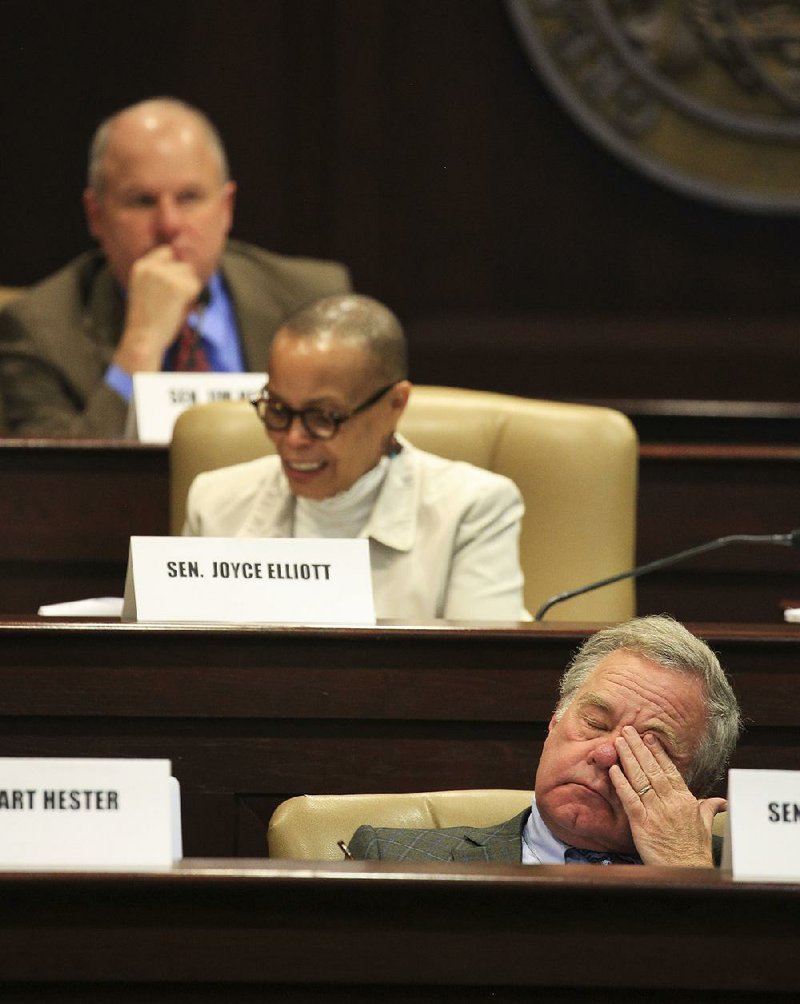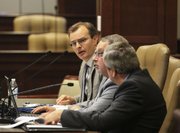The Legislature's tax overhaul task force has decided to study options for changing a small group of state sales-tax exemptions, but declined to look at the possibility of rewriting 36 others.
The Arkansas Tax Reform and Relief Legislative Task Force on Thursday afternoon wrapped up two days of meetings to narrow a list of 43 sales-tax exemptions, all recommended for consideration by the panel's members, to review during its August meeting.
Under state law, the task force is required to issue recommendations by Sept. 1 to Gov. Asa Hutchinson and the Legislature in advance of the 2019 legislative session that starts in January.
The task force voted Thursday to add the exemption on the sales of magazines and other publications -- other than newspapers -- through regular subscriptions to the list of six exemptions that it decided Wednesday to put on the short list for August.
Of exemptions under further review for possible changes, the one with the biggest impact on revenue is the reduced sales tax on groceries.
The task force Wednesday authorized the study of the possibility of increasing the sales tax on groceries and creating some type of income tax credit for low- and moderate-income people instead.
That option drew more discussion during Thursday's meeting.
Rep. Bob Johnson, D-Jacksonville, said, "If we take away the exemption on groceries, what about those on fixed income, Social Security, pensions that don't have earned income?" He said their taxes on groceries would increase, and "we are giving them no method to recover that" by creating an earned income tax credit.
"I think that's something that we have to address," he said.
In response, Lisa Gee, a senior policy analyst at the Institute on Taxation and Economic Policy in Washington, D.C., told the task force that one of the challenges of creating a state earned income tax credit as an offset to increasing the sales tax on groceries is that the federal earned income tax credit is targeted to people who are under the age of 65 and it primarily benefits working people with children.
"The best thing to do is to combine the [earned income tax credit] with a sales-tax rebate," she said. 'If you are not doing [an earned income tax credit] at all, you look at a more generous sales tax credit that would apply to a broader group of folks."
The sales tax on groceries is 1.5 percent and is to drop to 0.125 percent on Jan. 1 under a 2013 law that allows the use of savings from the state ending its desegregation payments to three Pulaski County school districts. From 2007-11, the Legislature enacted then-Gov. Mike Beebe's plans that gradually cut the state's 6 percent sales tax on groceries to 1.5 percent.
The state Department of Finance and Administration estimates that the 1.5 percent sales tax on groceries cut total state revenue by $248.9 million in fiscal 2017 that ended June 30, including $190.6 million in general revenue.
Amendment 92 to the Arkansas Constitution, approved by voters in 2012, increased the standard sales tax from 6 percent to 6.5 percent, and the half-cent tax raised funds for highways. But it "exempted food and food ingredients from the 1/2-cent sales tax for highways, so if the reduced rate on food and food ingredients is eliminated, those items will be taxed at a rate of 6%," Joi Leonard, an administrator for the Bureau of Legislative Research, said Thursday in an email.
After Thursday's meeting, a task force co-chairman, Rep. Lane Jean, R-Magnolia, said the task force will look at three proposals -- increase the grocery tax to 3 percent, 4.5 percent or 6 percent -- and creating either a refundable earned income tax credit, for those who work, or refundable income tax credit.
"We'll study that and see, do we need to subsidize a family of $40,000, or under $30,000, and where the number needs to be," he said.
"And we'll do some dynamic scoring against dropping the [state's top individual income tax rate of 6.9 percent] to maybe 6.5 [percent], 6.25 and maybe 6 percent, somewhere in that area, and try to see how it affects us on dynamic scoring on the economy, on taxes, on jobs and try to get the best guess of what effect we'll have on several different options to give the [task force] to look at and make a decision in August," Jean said.
With the approval of the Legislative Council, the Bureau of Legislative Research has contracted Amherst, Mass.-based Regional Economic Models Inc. to produce up to 16 "dynamic fiscal notes" on proposed legislation changing state revenue or expenses by at least $1 million. The contract, for up to $80,500, runs from May 1 through April 30, 2019, with an option to renew for six more months by mutual agreement.
In February, Hutchinson signaled to lawmakers that he wants the 2019 Legislature to cut the top individual income tax rate from 6.9 percent to 6 percent, effective Jan. 1, 2020, which he projected would reduce revenue by about $180 million a year.
In 2015 and 2017, the Legislature enacted Hutchinson's plans to cut individual income tax rates for Arkansans with up to $75,000 a year in taxable income. The plans are projected to collectively reduce revenue by about $150 million a year.
Senate Democratic leader Keith Ingram of West Memphis, a member of the task force, said in an interview Thursday that he was surprised that the panel voted to study the possibility of creating an income tax credit for low- and moderate-income people to offset paying higher grocery taxes.
"That sort of caught me off guard, because all I quite honestly ever heard from the majority [Republican] party [was] that the earned income tax credit was rife with fraud," Ingram said in an interview.
"If the majority party now feels that is a good targeting mechanism for the poor of the state, which many Democrats have thought that for many years, then I think we can really do something great for the great majority of the people of the state by introducing the earned income tax credit and leaving the sales tax [on groceries] on one-eighth [of a cent]," he said.
"We'll see where the governor decides to go with this," Ingram said.
Hutchinson said Thursday that he has historically been an advocate for exempting groceries from the sales taxes.
"It is a means of helping those that are on a limited budget," he said in a written statement.
"I am fine with the Legislature studying this issue, and we will wait and see if they recommend a better option for helping those on a limited income. We all have the same goal of reducing the tax burden. I will reserve any final judgment until after the task force makes its final conclusions," Hutchinson said.
The other exemptions that the task force plans to study are the back-to-school tax holiday for school supplies, clothing and clothing accessories; services provided by coin-operated carwashes; sales of four-wheelers and all-terrain vehicles for farm use; those for named nonprofit entities; and any exemption of less than $10,000.
The task force plans to meet May 10 for its members to submit their lists of particular individual and corporate income tax exemptions and credits that they want to take a closer look at.
A Section on 04/27/2018

